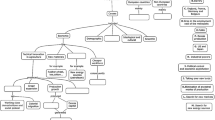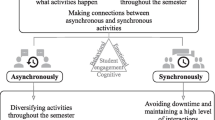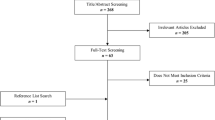Abstract
Audiovisual materials for nursing students typically show a female nurse demon-strating activities as they are described (and sometimes directed) by a male narrator. Of obvious concern is the effect of such sex stereotyping on female students. Further, do students (male and female) learn as well from instructional video-tapes narrated by an equally competent female narrator? The investigator sought to control all variables but gender of narrator in this study of conceptual learning from videotapes.
Similar content being viewed by others
References
Caffrey, J. Auding ability at the secondary level.Education, 1955,75, 303–310.
Campbell, D. T., & Stanley, J. D.Experimental and quasi-experimental designs for research. Chicago: Rand McNally, 1963.
Cantril, H., & Allport, G.The psychology of radio. New York: Harper & Bros., 1936.
Clark, R. L. Media, mental imagery, and memory.Educational Communication and Technology Journal, 1978,26, 355–363.
Fleming, M. L. The picture in your mind.AV Communication Review, 1977,25, 43–62.
Gardiner, J. M., & Cameron, P. C. Change in speaker’s voice and release from proactive inhibition,journal of Experimental Psychology, 1974,102, 863–867.
Geiselman, R. E., & Bellezza, F. S. Incidential retention of speaker’s voice.Memory and Cognition, 1977,5, 668–675.
Geiselman, R., & Glenny, J. Effects of imagining speaker’s voices on the retention of words presented visually.Memory and Cognition, 1977,5, 499–504.
Globig, L. J., & Touhey, J. C. Sex and affective determinates of lecture content retention.Psychological Reports, 1971,29, 538.
Goldhaber, G. M., & Weaver, C. H. Listener comprehension of compressed speech when the difficulty, rate of presentation, and sex of the listener are varied.Speech Monographs, 1968,35, 20–25.
Irwin, C. E. Evaluating a training program in listening for college freshmen.School Review, 1953,61, 25–29.
Levie, W. H. A prospectus for instructional research on visual literacy.Educational Communication and Technology Journal, 1978,26, 25–36.
Light, L. L., Stansbury, C., Rulin, C., & Linde, S. Memory for modality of presentation: Within-modality discrimination.Memory and Cognition, 1973,1, 395–400.
Pearson, B. D. Applying learning theory and instructional film principles to films for learning observation skills.AV Communication Review 1972,20, 281–295.
Peters, J. M. L. The necessity of learning how to see film.AV Communication Review, 1955,3, 197–205.
Plost, M., & Rosen, M. J. Effect of sex of career models on occupational preferences of adolescents.AV Communication Review, 1974,22, 41–50.
Rossiter, C. M. Sex of the speaker, sex of the listener, and listening comprehension.Journal of Communication, 1972,22, 64–69.
Severin, W. J. The effectiveness of relevant pictures in multi-channel communication.AV Communication Review, 1967,15, 386–401.
Wertsch, J. V.The influence of listener perception of the speaker on psycholinguistic processing. Unpublished doctoral dissertation, University of Chicago, 1975.
Author information
Authors and Affiliations
Rights and permissions
About this article
Cite this article
Pearson, B.D. Effects of narrator gender on conceptual learning. ECTJ 28, 203–208 (1980). https://doi.org/10.1007/BF02765367
Issue Date:
DOI: https://doi.org/10.1007/BF02765367




